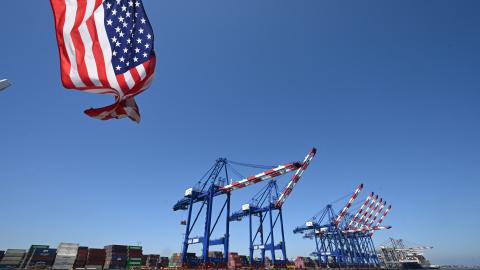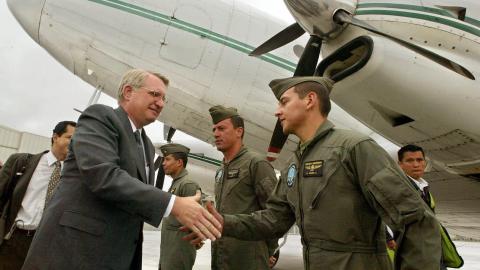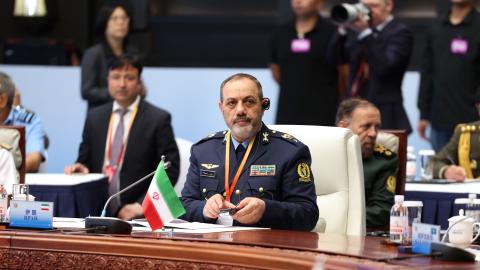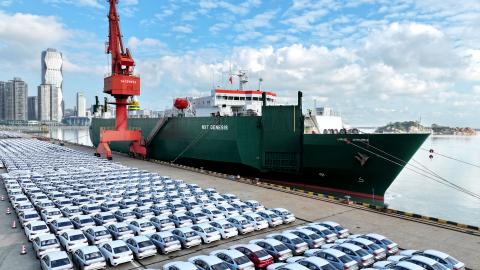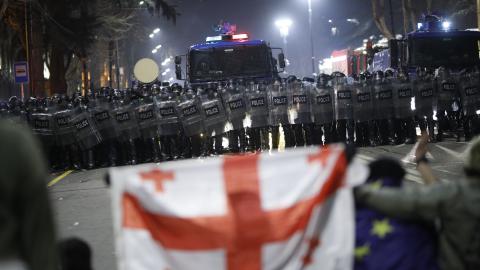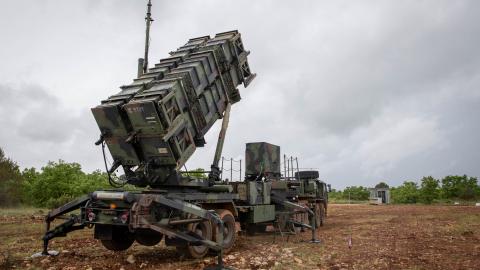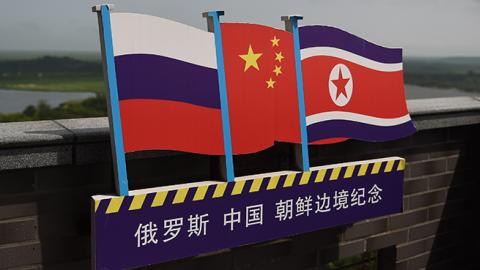The communiques out of the U.S. Mission to the United Nations were exultant on Monday. They lauded the unanimous passage in the Security Council of the “strongest sanctions ever imposed” on North Korea for its nuclear weapons program. Among other prohibitions, North Korea has now been prevented from exporting textiles—one of its few industries. It will also have a harder time importing oil and fuel, won’t be able to send its workers abroad to earn cash as easily, and will be forced to shutter any joint ventures. But as The Washington Post’s Joby Warrick reported, the sanctions were heavily watered down thanks to objections from China and Russia.
Rightfully, there has been much condemnation of the China-based companies that do business with North Korea and Chinese-North Korean entities that continue to operate. These entities make up the largest source of hard cash and material reinforcements for Kim Jong Un’s hermit kingdom, but Russia’s support of North Korea is also quite significant, and has grown alongside international condemnation of that regime’s belligerence.
Moscow’s assistance to Pyongyang has emerged not out of a desire to promote its nuclear program, but because Vladimir Putin, the president of Russia, sees Kim very much like he see his own country: victims of a U.S.-led international system that tramples on their choices and sovereignty. Russia is itself under international sanctions intended to punish Moscow for its military actions in Ukraine. For Russia, sanctions that successfully force North Korea either to alter its military choices or lead to a change in its leadership would set a dangerous precedent—the possibility of regime change anywhere is never to be encouraged.
Pyongyang’s economic engagement with Moscow ranges from small enterprises to large schemes that help Russia more cheaply fulfill its goals. The U.S. State Department approximates that around 20,000 North Koreans are sent—most, forcibly—to work in Russia each year for Russian companies (some estimates say the number is as high as 50,000). North Korea’s largest money makers in Russia are in the fields of logging and construction. These workers live in “slave-like conditions,” are poorly fed and equipped, and only receive a small fraction of the salaries that they are due. The rest, allegedly, goes straight to Kim’s coffers.
According to James Hoare’s Historical Dictionary of the Democratic People's Republic of Korea, Russia has hosted North Korean labor camps since 1967, when the then-Soviet Union was shrinking its notorious gulag system. Many gulag camps had forced their prisoners to do hard, manual work; the arrival of North Koreans helped replace some of that cheap labor. These North Korean camps, which exist to this day, do the same kind of logging work in Siberia’s harsh, endless forests that their gulag predecessors once did.
North Korean construction workers toil in similarly miserable situations. They were spotted by Norwegian journalists working to finish the newly opened Zenit Arena in St. Petersburg that will be used during the 2018 World Cup. One worker told The Guardian that the men were earning money to help “facilitate the country’s defense.” German journalists have also found North Koreans working to repair and complete World Cup 2018 stadiums in Moscow and Ekaterinburg. Qatar, which will host the 2022 World Cup, has taken its lead from Russia and currently has 2,800 North Koreans working in part to build the infrastructure needed for the event.
In addition, there are a variety of small North Korean-owned businesses across Russia. These range from North Korean-owned, -operated, and -staffed restaurants in Russia’s far east, to small tourism operations. North Korea recently opened a travel agency in Russia to bring Russian tourists to North Korea, while a passenger and cargo ferry service between Vladivostok, Russia, and Rason, North Korea, was opened in May 2017. Russian businesses in Vladivostok often hire North Koreans to paint and decorate homes in their city.
While these workers may be the main conduit of Russian money into North Korea, Russia has aided the country in other ways. In 2014, it forgave 90 percent of the nearly $11 billion in debt that it (and the Soviet Union before it) was owed by North Korea. The remaining portion of the debt was to be repaid to Russia by deposits into an account that could then be used to grow Russian-North Korean ties and trade. To avoid the difficulties that western sanctions have placed on payments and financial transfers to North Korea, the two countries have an arrangement by which Russia pays Pyongyang in rubles.
In its latest tranche of sanctions on North Korea, the U.S. Treasury Department included some Russian individuals and Russian-linked companies that assist Pyongyang in laundering money and obtaining fuel, exposing the means through which Russia—like China—helps keep the lights on in North Korea.
Altogether, the total volume of trade between North Korea and Russia is quite small, though likely underreported. In 2016, the trade volume between the two countries was only $76.9 million, down from a high of $234.9 million in 2005. So why, then, is Moscow loath to crack down on Pyongyang? The answer may lie in the use of the West's favorite instrument of international punishment: sanctions.
While Putin has said that North Korea’s nuclear program “is creating threats to security in North-east Asia,” he has also condemned the idea that it is possible to solve the North Korea issue with “sanctions and pressure alone” and warned against “driving North Korea in a corner.” For a Russia that remains under relatively heavy U.S. and European Union sanctions for its annexation of Crimea in 2014, its continued invasion of eastern Ukraine, and the shoot-down of Malaysian Airlines Flight 17 in July 2014, helping North Korea stand firm against Western pressure is rather a matter of principle.
Resisting U.S. calls for strict sanctions on Pyongyang is yet another way for Putin to demonstrate to both his public and the international community that he will not give in to western pressure to change his behavior in Ukraine. Through Russian eyes, then, North Korea's resolve in the face of American and international pressure is admirable and worth supporting. So while Russia may seem to go along with UN sanctions on North Korea, it works behind the scenes to make them as toothless as possible. Monday's sanctions package, for example, originally would have banned the use of North Korean labor, but was weakenedafter Russian protests. Those concessions they do make on sanctioning North Korea are carefully calculated to give up as little as possible, continue aiding North Korea as much as possible, and maintaining the façade that Russia is a useful international partner.
When asked recently about the effect that sanctions were having on North Korea, Kremlin spokesman Dmitry Peskov asserted that “the imposed sanctions have not created any positive outcome.” Yet part of their failure can be chalked up to Russia’s refusal to truly adhere to these sanctions, and the Russian government’s continued insistence on maintaining its economic relationship with North Korea. There is unfortunately little to be done about Russia’s determination to undermine sanctions on North Korea. After three years under similar sanctions Russia has become adept at evading the worst strictures and is happy to help North Korea do the same.
A North Korea that shrivels under harsh sanctions is not an acceptable option for Moscow. To allow such a scenario would be to admit its own vulnerability to similar measures. The Kremlin is certainly not thrilled about North Korea's nuclear ambitions, but for now it is more important for birds of an anti-Western feather to flock together. Meanwhile, nations committed to halting North Korea’s belligerence will have to work harder and more creatively to both calm the North Korean situation and buttress the international order.
